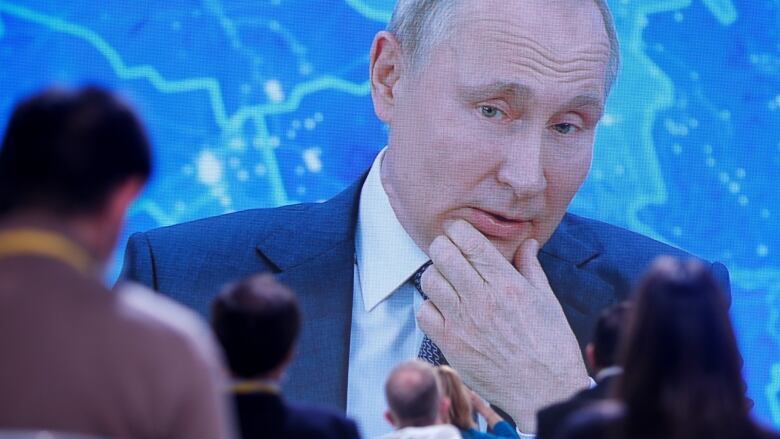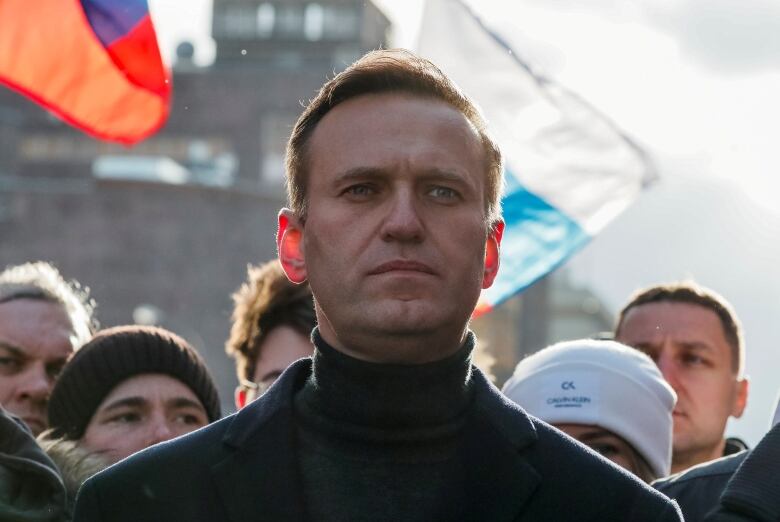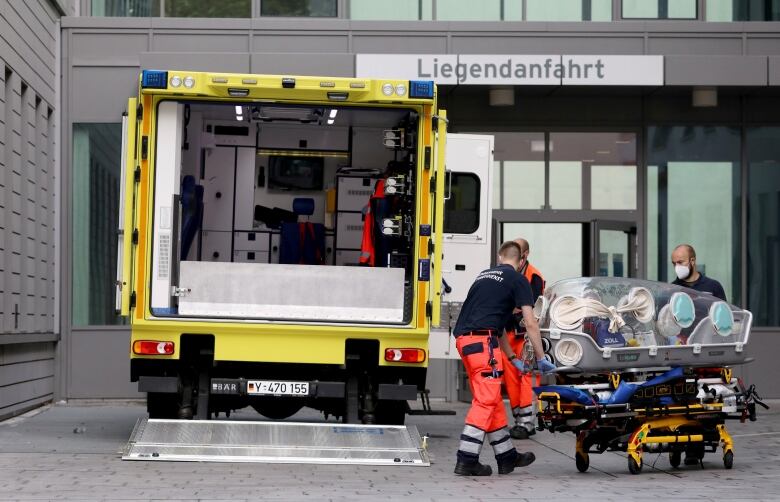Following Putin and state media's lead, many Russians dismissive of Navalny poisoning case
Putin says if someone had wanted to poison rival Alexei Navalny, 'they would have finished him off'

After several days of silence, perhaps the only surprising thing about Russian President Vladimir Putin's denials Thursday that his secret police played a roleinpoisoninga political opponent was that he punctuated his comments with an uncomfortable-sounding chuckle.
"Who needs him?" Putin said of political foe Alexei Navalny during anews conference, laughing as he dismissed news reportsthat members of Russia's federal security service, the FSB, specializing in nerve agents, followedNavalny during a trip to Siberia in August, where he was poisoned by the nerve agent Novichokand nearly died.
"If someone had wanted to poison him, they would have finished him off," said Putin, returning to the well-worn Kremlin talking point that Russia's secret services are too good to make such clumsy mistakes.
Putin denigrated Navalny as a nobody striving for political legitimacy, even providing a mocking imitation of his rival.
"Pay attention it means I am a person of the same calibre [as Putin]," he said.
While the revelations about the FSB's activities, published earlier this week by several Western news outlets,have enthralled many in the West, the Navalny case has long been largely ignored by the Russian media and so, perhaps not surprisingly, by many Russians as well.

Navalny was airlifted to a hospital in Berlin shortly after he waspoisonedon Aug. 20, and has remained in that country even as his crusade against Putin has continued.
A lawyer by training, Navalny is one of the very few political figures in Russia who has directly challenged Putin's authority and risked his own life and security by organizing mass protests. Yet, while his investigations into corruption involving senior members of Putin's inner circle have been viewed tens of millions times on YouTube, he remains a polarizing figure.
Many Russians appear to believe Putin's claim that Navalny works for foreign intelligence agencies, and even some Western-leaning liberals see him as a divisive figure who has failed to create a strong anti-Putin coalition.
Bellingcat investigation
The new revelations in the Navalny case comevia a detailed investigation led by the international journalism collective Bellingcat.
Its investigative team says the findings were procured from data that can easily be purchased on the black market, including cellphone records and passenger flight logs.
The findings include evidence suggesting Russia's secret police have used a special unit to trail Navalny since 2017, following him to 37 different locations around Russia. Bellingcat alleges it tracked the cellphone usage of several members of the team and those records put them with Navalny at the time he was poisoned in Siberia.
The journalists even released photos of the men, as well as their aliases and work and home addresses. A CNN reporter knocked on the apartment door of one of the men, but he quickly shut it after she introduced herself.
Bellingcat also alleges the men reported to a senior officer who was once associated with the Novichok nerve agent program, and that the chain of command led straight to Putin himself.
At Thursday's news conference, Putin didn't deny that Russian agents could be tracked by their cellphones, or that they may have had reason to keep an eye on Navalny.
"Don't we know that [foreign intelligence agencies] track geo-location? Our intelligence services fully understand that and know it," said Putin, as he repeated his claim that Navalny himself must be an agent of the U.S.
"It's not an investigation it is the legalization of data from the U.S special services," Putin said.

Putin's constant refusal to discuss Navalny has seen him resort to using different descriptors rather than simply saying Navalny's name.
On Thursday, Navalny was the "Berlin clinic patient."
Russian disinterest
While the allegationsabouttheFSB's activitieshavebeen widely reported outside of Russia, within the country itself, it's an entirely different story.
Until Putin's comments Thursday, state TV programs ignored the story. Even the social media feeds of many of the Kremlin's usual critics have been quiet on the topic.

At the news conference in Moscow, the CBC approached several prominent Russian journalists to ask why.
"I think Western media just pays too much attention to this person," said host Mikhail Akinchenko of Channel One, borrowing Putin's technique of not referring to Navalny by name.
"He's not so interesting for our news agenda as for you, maybe because he's not [such a] significant person for us."
WATCH | State TV journalist explains lack of coverage of Navalny case:
And what of the evidence that suggests the FSB may have tried to kill Navalny?
"Only that person who does not know the real situation in Russia," would take the poison allegations seriously, Akinchenko said.
"It can't happen in real life."

Navalny and his supporters have been arrested repeatedly by Russian police for organizing anti-Putin protests. He's also been physically attacked and had corrosive green paint thrown in his face.
A video Navalny posted this week, in which he directly accused Putin of being complicit in his attempted murder, had already been viewed more than 10 million times by the time the Russian president addressed the news conference.
Nonetheless, there's also persuasive evidence that the Kremlin's efforts to marginalize Navalny and minimize his political impact have been effective.
A survey conducted in late October by respected independent pollster the Levada Center suggests 55 per cent of Russian respondents said they don't believe Navalny was poisoned.
Of the one third who said they believe he had been poisoned, only a third of those said they believe the Russian state was behind it.
Public skepticism
In the days after Bellingcat's revelations were released but before Putin spoke about them, the CBC visited the community of Zvenigorod, a town of about 15,000 people located 70 kilometres west of Moscow.
Former railway worker Alexy Provorovsky, 39, stopped to talk on his way out of church but, like many people, was reluctant to discuss the Navalny story directly.
"I don't really want to say anything about this," he said. "[People] are only thinking about their families and their close ones now. They only think about themselves, just to survive."
Elena Pomina, 30, said she was only vaguely aware of the Navalny case and what might have happened to him.
"I'm not for or against him. It's not really my business," she said.
Younger Russians who spoke with the CBCwere generally moreaware of the details and more sympathetic towardNavalny.
WATCH | Putin laughs off accusations of Kremlin-controlled hit againstNavalny:
Daria Generalova, an 18-year-old artist who works in a gift shop in the town, said the government's comments that Navalny might not have been poisoned aren't credible.
"It can't be that a person who is healthy like this, and quite young still, that he just suddenly falls so ill," she said.
"It's awful. It's even frightening, actually."
Levada pollster Denis Volkov told a forum earlier this week that support for Putin is strongest among the older generation that still gets their news from state TV sources, while younger people who rely on the internet are far more likely to favour Kremlin outsiders, such as Navalny.
After Putin's news conference, Navalny was sounding pleased with how his week had gone.
"Of course they can't open a criminal case now, because this would be a criminal case against Putin," he told host Lyubov Sobol, one of his supporters, who was broadcasting on Navalny's YouTube channel.
"And Putin, who is the king of lies, who can lie about anything no problem, even he in this situation can't deny that there were FSB agents that followed me."














_(720p).jpg)


 OFFICIAL HD MUSIC VIDEO.jpg)
.jpg)



























































































